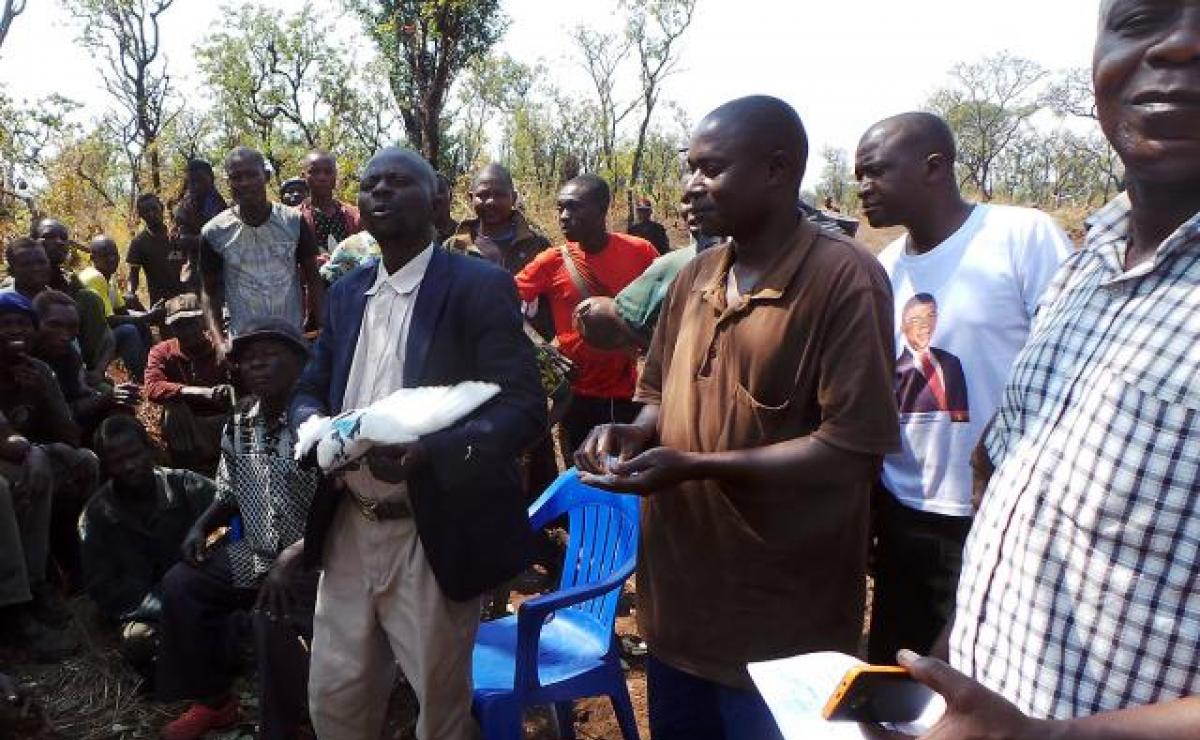“I feel honoured to host the DRC refugees”

Senior chief in Angola’s Lunda Norte province speaks about refugee crisis in his country
“I feel honoured by the government´s decision to host the refugees from the Democratic Republic of Congo (DRC) in my area” says Francisco Muhangenu (50), a senior chief of Lunda Norte Province, Angola, standing between his fellow chiefs during a traditional ritual for blessing the refugee camp site. “We are the same people despite the border line which has separated us.”
Violent clashes between government and opposition forces in DRC’s Kasai province have displaced more than 1.4 million. More than 33,000 Congolese have sought refuge in Angola’s Lunda Norte province, 300-500 more arrive every day. 75% are women or children.
“All the refugees are in urgent need of protection, medical and psychosocial assistance, shelter, food and basic relief items,” says Abraham Mushivi, National Coordinator for the Lutheran World Federation (LWF) in Angola.
“The refugees are sheltered in two reception centres, which are currently operating at their maximum capacity. The conditions make it difficult to provide adequate protection and assistance.” LWF has opened 10 km of access road, cleared the reception centres and later started constructing facilities for and providing water and sanitation in the two reception centres and the new camp site in Lovua.
“Many of those who have fled report harassment, violence and killing,” Mushivi adds. United Nations observers in DRC have discovered mass graves and reported atrocities. Survivors report that all conflict parties are burning houses, using rape as a weapon of war, and recruiting children into armed forces or using them as human shields.
Hope for local development
In Lunda Norte, host communities have given up land to host the new arrivals. A “challenge”, as senior chief Muhangenu concedes. “Our livelihood depended on that land. Some parts of the land have been used for farming, hunting and caterpillars collecting, this has been our livelihood for a long time.”
“But this does not mean the refugees are not welcome in the area!” he emphasizes.
Like the other chiefs, Muhangenu hopes that the presence of the refugees will lead to development of the region. “The presence of our brothers and sisters (refugees) will bring many benefits because the UNHCR and other partners will do many things in the camp and with host communities,” he says.
“They will provide social infrastructure like health care, schools and a water supply network which indirectly all of us will have access to.” He hopes that local children will benefit from new schools, and especially mothers and elderly will be able to access health care in the neighborhood.
“They will not be called by tribe”
He does understand however that people will need convincing before they accept the large numbers of refugees that currently cross into their country. “Many Angolans, particularly of Lunda Norte once took refuge in the Democratic Republic of Congo during the Angolan civil war. Now it is time for us to welcome our brothers and sisters to our land,” he says.
Muhangenu looks tothe LWF and other agencies for support. He also appeals to the new arrivals to not bring the conflict which drove them away into their new home. “Our brothers and sisters will not be called by tribe here,” he says. “There is no Chokwes or Balumbas here, they are all refugees under our protection.”
Peacebuilding is an integral part of LWF work in the region. After meeting with leaders of the local communities, LWF engaged the host communities in all the camp site work. “While working with them, we continued to discuss with them how to host the refugees,” Mushivi says. “We also discussed what benefits may come their way because of living near the refugee camp and how to handle conflicts.”
“Protecting the rights of the refugees means they also need to know the law and the rights of their hosts,” the senior chief adds.
“I pray for peace in DRC and I wish all the refugees good health during their stay on my land”.
Interview by Abrao Mushivi, National Coordinator, LWF Angola program. Edited by LWF Communication Services.

